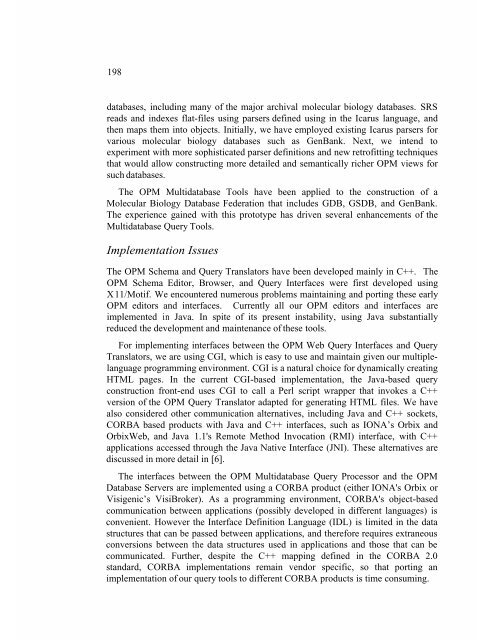You also want an ePaper? Increase the reach of your titles
YUMPU automatically turns print PDFs into web optimized ePapers that Google loves.
198<br />
databases, including many of the major archival molecular biology databases. SRS<br />
reads <strong>and</strong> indexes flat-files using parsers defined using in the Icarus language, <strong>and</strong><br />
then maps them into objects. Initially, we have employed existing Icarus parsers for<br />
various molecular biology databases such as GenBank. Next, we intend to<br />
experiment with more sophisticated parser definitions <strong>and</strong> new retrofitting techniques<br />
that would allow constructing more detailed <strong>and</strong> semantically richer OPM views for<br />
such databases.<br />
The OPM Multidatabase Tools have been applied to the construction of a<br />
Molecular Biology Database Federation that includes GDB, GSDB, <strong>and</strong> GenBank.<br />
The experience gained with this prototype has driven several enhancements of the<br />
Multidatabase Query Tools.<br />
Implementation Issues<br />
The OPM Schema <strong>and</strong> Query Translators have been developed mainly in C++. The<br />
OPM Schema Editor, Browser, <strong>and</strong> Query Interfaces were first developed using<br />
X 11/Motif. We encountered numerous problems maintaining <strong>and</strong> porting these early<br />
OPM editors <strong>and</strong> interfaces. Currently all our OPM editors <strong>and</strong> interfaces are<br />
implemented in Java. In spite of its present instability, using Java substantially<br />
reduced the development <strong>and</strong> maintenance of these tools.<br />
For implementing interfaces between the OPM Web Query Interfaces <strong>and</strong> Query<br />
Translators, we are using CGI, which is easy to use <strong>and</strong> maintain given our multiple-<br />
language programming environment. CGI is a natural choice for dynamically creating<br />
HTML pages. In the current CGI-based implementation, the Java-based query<br />
construction front-end uses CGI to call a Perl script wrapper that invokes a C++<br />
version of the OPM Query Translator adapted for generating HTML files. We have<br />
also considered other communication alternatives, including Java <strong>and</strong> C++ sockets,<br />
CORBA based products with Java <strong>and</strong> C++ interfaces, such as IONA’s Orbix <strong>and</strong><br />
OrbixWeb, <strong>and</strong> Java 1.1's Remote Method Invocation (RMI) interface, with C++<br />
applications accessed through the Java Native Interface (JNI). These alternatives are<br />
discussed in more detail in [6].<br />
The interfaces between the OPM Multidatabase Query Processor <strong>and</strong> the OPM<br />
Database Servers are implemented using a CORBA product (either IONA's Orbix or<br />
Visigenic’s VisiBroker). As a programming environment, CORBA's object-based<br />
communication between applications (possibly developed in different languages) is<br />
convenient. However the Interface Definition Language (IDL) is limited in the data<br />
structures that can be passed between applications, <strong>and</strong> therefore requires extraneous<br />
conversions between the data structures used in applications <strong>and</strong> those that can be<br />
communicated. Further, despite the C++ mapping defined in the CORBA 2.0<br />
st<strong>and</strong>ard, CORBA implementations remain vendor specific, so that porting an<br />
implementation of our query tools to different CORBA products is time consuming.


